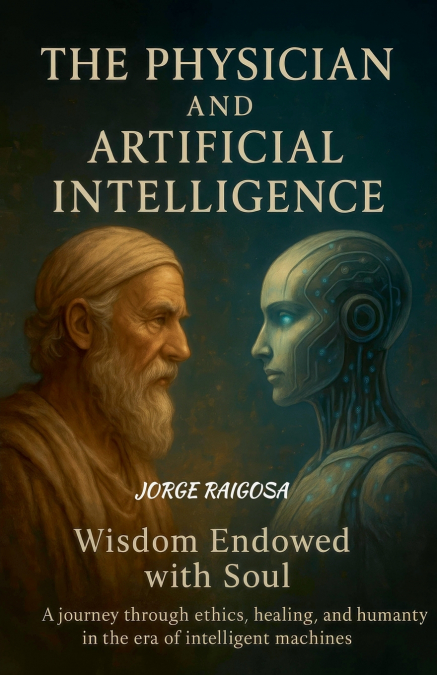
JORGE RAIGOSA
Medicine with Soul in the Age of Artificial Intelligence is a deeply thoughtful exploration of the intersection of two worlds: swiftly advancing AI and medicine as an art, science, and spiritual vocation. Against a backdrop where algorithms and machines begin to occupy spaces traditionally held by human judgment, the author proposes not opposition but discernment on how to integrate advances without losing our humanity.Structured in four parts, the book balances critical analysis, ethical insight, symbolic dialogues, and hopeful vision for medicine’s future as a sacred call:Part I: Understanding ChangeExamines the emergence of AI in medicine, ethical challenges, and opportunities. From clinical care cycles to informed consent in a digital age, it underscores the irreplaceable role of discretion, intuition, and compassion. Imagined dialogues with Hippocrates and Galen update classical medical thought in the face of modern code, while emphasizing the physician’s inner silence amidst machine noise.Part II: Humanism, Science, and SoulDelves into the wounded spirit of clinical care. Through chapters on spirituality, narrative medicine, healing rituals, and end-of-life decision-making, it addresses dimensions often forgotten by technical paradigms. It affirms presence, active listening, and holistic care as necessary counterweights to AI’s limitations.Part III: Ethics, Justice, and New PathwaysTackles the societal and political impacts of digital medicine, addressing risks of AI-guided self-prescription, tech access inequality, and calls for public policies ensuring real medical justice. The patient’s autonomy becomes an expression of their uniqueness. Technology must serve inclusion-never exclusion.Part IV: Light, Commitment & Inner JourneyInvites conversation about soul, silence, and service. Presents a vision of the physician as guardian of the human spirit, bearer of light. With a final prayer and manifesto, the book restores the physician’s deepest dignity: a bridge between technique and transcendence. The epilogue evokes the Spirit of God as unseen guide, closing with humility, love, and devotion to a healing more human than ever.